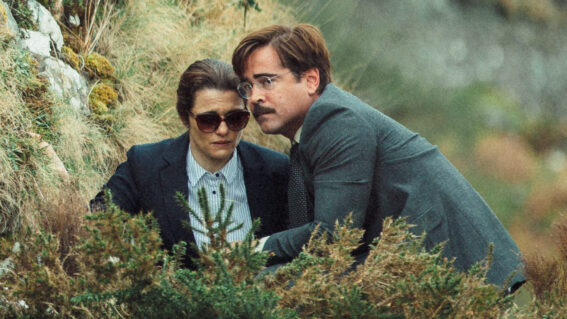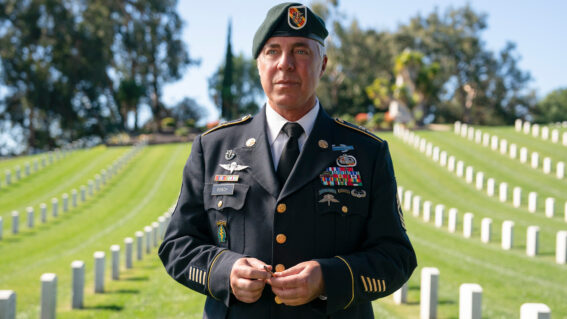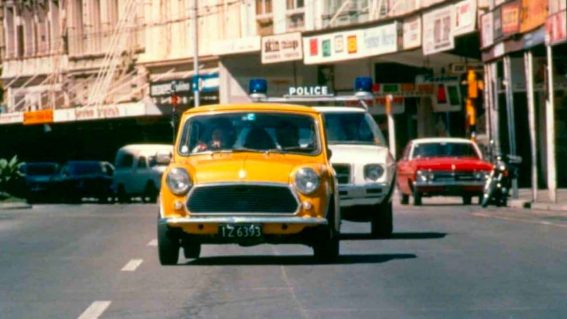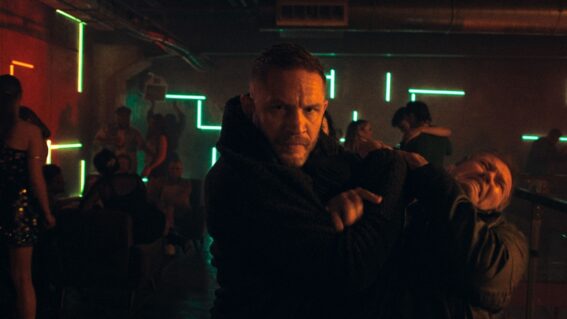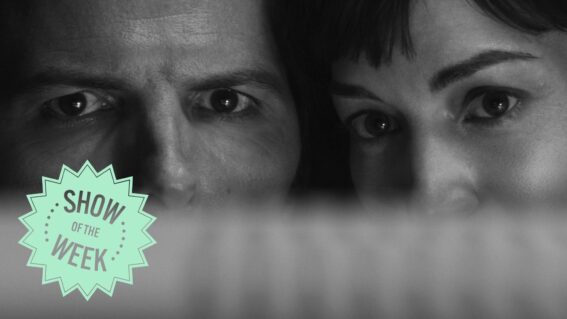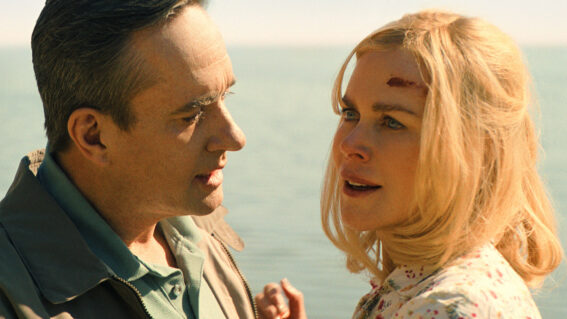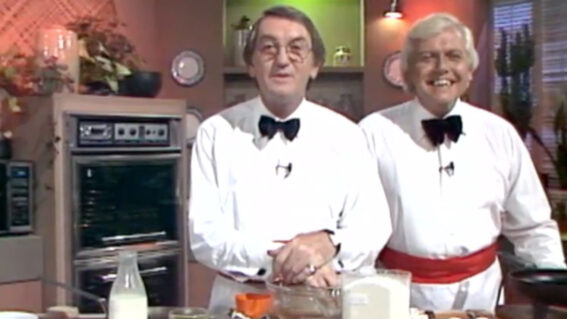The good, the bad, and the ugly influences that make Yellowstone one of TV’s top shows
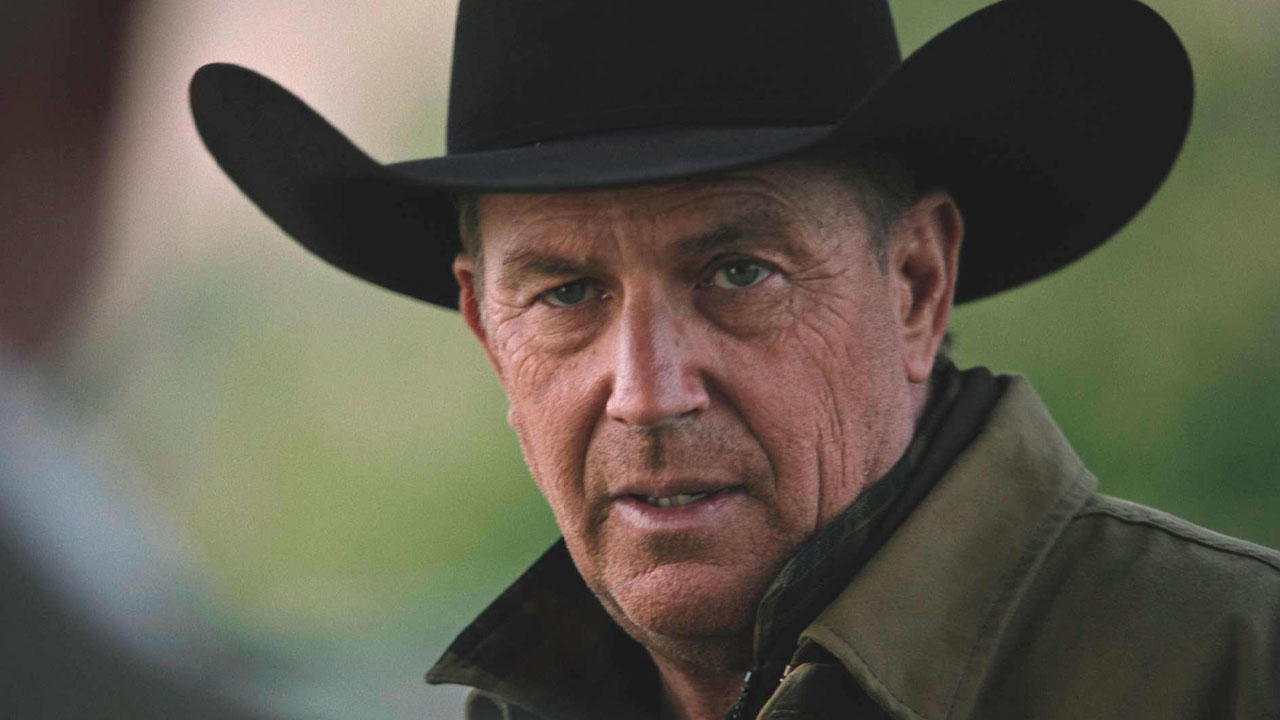

The fifth season of Yellowstone is on the horizon, with a two-hour premiere event streaming on Neon on November 14. Adam Fresco breaks down the mega-popular show’s influences, highlighting the inspirations, roots, and genre tropes behind his favourite Western-soap opera-gangster-drama.
I’ve waxed lyrical about Yellowstone before but with the release of season five nigh, it’s high time I donned my stetson and saddled up again. Whether you’re an old hand, or new to the Dutton-Yellowstone ranch, here’s your guide to the many influences that make up the unique blend of grits n’ beans that is Yellowstone–from wild, wild Western movies, to long-running TV soap operas, gangster family sagas, pot-boilers, melodramas, and old-school romance.
It’s The Godfather… on horseback
As the grizzled patriarch of his family’s gigantic ranch, Kevin Costner’s John Dutton follows in a long line of father figures focused on their legacy. John’s morality begins and ends with family. All he wants is to protect his land and property and pass them on, but there’s always some vulture in a suit or a stetson circling, keen to snatch away the Dutton ranch, one bite at a time. As John says: “It’s the one constant in life. You build something worth having, someone’s gonna try to take it.”
If that sentiment sounds familiar, it might well be because it’s the same placing of family above all, and legacy over profit, that motivates not one, but two Dons in Francis Ford Coppola’s 1972 American opus The Godfather. First, there’s Marlon Brando’s Don Corleone, for whom “a man who doesn’t spend time with his family can never be a real man”.
Rising to his father’s throne, in 1974s The Godfather Part II, Al Pacino as Michael Corleone inherits the Don’s desire to place family first, warning his brother, Fredo: “Don’t ever take sides with anyone against the Family. Ever”
No surprise then that Taylor Sheridan—Yellowstone showrunner, writer, series creator and regular actor—is a big fan of Coppola’s mobster family classic. Sheridan has talked about his show as being, at its core, about family, and the many threats it faces in modern America. For Don Corleone, the key was simple: “The strength of a family, like the strength of an army, lies in its loyalty to each other.” In The Godfather, the Corleone family is ultimately undermined by in-fighting, disloyalty, betrayal, and ambition to seize the old Don’s place and power; in Yellowstone, the greatest threat to the Dutton clan comes not from outside forces, but from disloyalty and distrust amongst John’s children.
It’s Bonanza… on steroids
Fans of Quentin Tarantino’s fabulous Once Upon A Time In Hollywood (and his wildly entertaining novelised version) will recognise the huge influence of television Westerns on his generation of kids who grew up to be Hollywood players. Taylor Sheridan was brought up on old-school TV Westerns too, and rose to fame as an actor in the likes of hit TV motorcycle gang drama Sons of Anarchy, and as screenwriter for the movies Sicario and Hell or High Water. As well as writing, he also sat in the director’s chair for Wind River, which starred both Jeremy Renner and Elizabeth Olsen, and Angelina Jolie-versus-a-forest fire thriller Those Who Wish Me Dead. His love of all things Western shines through in pretty much everything he does. No surprise then, that the biggest shows of the many television Westerns of the 1950s and early 1960s centred on families, fighting to keep the peace on their ranches.
When it comes to US TV Westerns, the grandaddy of them all was probably Gunsmoke, which first hit cathode ray screens in 1955. Starring James Arness as Dodge City Marshall Matt Dillon, Gunsmoke was the show that catapulted a young Burt Reynolds to movie stardom in his role as cowboy, Quint Asper.
Then came Wanted: Dead or Alive in 1958, launching the career of one Steve McQueen, who starred as bounty hunter Josh Randall.
In 1962, The Virginian arrived, starring James Drury, Doug McClure, Lee J. Cobb, and later Stewart Granger, in a series centred on The Shiloh Ranch in Wyoming. A ranch that the patriarch of the family would do anything to protect, so that he might pass on his legacy to his children. Sound familiar?
But perhaps the biggest Wild West-set show to influence Yellowstone was Bonanza, the NBC show that ran from 1959 to 1973 with a whopping run of 14 seasons and 431 episodes. Set in 1860s Nevada, Bonanza centres on the wealthy Cartwright clan, led by patriarch Ben Cartwright (Lorne Greene), and his sons, Hoss (Dan Blocker), Adam (Pernell Roberts), Little Joe (Michael Landon), and Will (Guy Willams). Throughout its long run, the series focused firmly on the moral dilemmas faced by the family in running the Ponderosa Ranch and keeping the family and their property safe from poachers, outlaws, gunslingers, land-grabbers, and all manner of low-down, good-for-nothing varmints, vagrants and vagabonds. Basically, Bonanza is Yellowstone, only without the cussing, sex, and dubious justifications for political machinations, murder, and mayhem committed for the Dutton family’s benefit.
It’s The Sopranos… in stetsons
If you’re showrunner David Chase and you take Bonanza and fuse it with the likes of Martin Scorsese’s mob story Goodfellas, you get The Sopranos. Heck, the series even stars an amazing 27 actors who feature in Goodfellas.
Chase’s HBO crime drama centres firmly on family, both in the domestic and the gangland sense, with James Gandolfini’s Italian-American patriarch Tony Soprano juggling duties between playing husband and father, and leading a tough, seedy, and often violent New Jersey crime syndicate.
Just as in The Sopranos, Kevin Costner’s John Dutton heads his family, and will stop at nothing to protect his own. From beatings to murder, Dutton is not a million miles removed from Tony Soprano, especially in Sopranos scenes that juxtaposed Tony’s suffering at difficult family dinners with his dealing out suffering to rival mobsters. It doesn’t take a DNA test to realize that Tony and John are related, sharing not just similar narrative set-ups, but character traits ranging from the good (loving their family), through the bad (they’re both pretty racist, misogynistic, and chauvinistic), to the downright ugly (with both being prone to violence and even murder to protect what they regard as theirs). But, no matter how tough they are, neither Tony nor John are any match for family members at the dinner table…
It’s Dallas… in Montana
Those of a certain vintage will recall that Dallas, and its villainous J.R., was a cultural phenomenon—not least of all in its season three “Who shot J.R.?” cliffhanger. As portrayed by Larry Hagman, John Ross Ewing was the ruthless, no-good oil baron who stole every scene (and ate all the scenery) of the CBS global television soap, a hit in the ’70s and ’80s. Remember your parents (or grandparents) rushing to the sofa on hearing those opening credits?
Think Succession, only with a heck of a lot more hairspray and shoulder pads, and you have Dallas—a show that ran from 1978 to 1991, with 357 episodes and a plot not a million miles of oil pipeline away from Yellowstone. There’s the incredibly rich family, the Ewings, living on their ranch Southfork and presiding over an empire of oil. As the family patriarch, Jock Ewing, former cowboy actor Jim Davis played the Costner role, but the fan favourite was always Hagman as his son, J.R. And, just as the success of Yellowstone has spawned spin-off shows, so Dallas birthed the not-so-excellent Knots Landing (which started in 1979 and itself somehow lasted an incredible 344 episodes, despite buckets of kitsch, cliché, and cringe-worthy dialogue).
The success of the soap operatics of Dallas, ranging from saccharine romances to crazy crimes, was a huge influence on TV drama, and copies were quick to cash in on its success. Perhaps the best known is Dynasty, a soap set in Denver that ran from 1981 to 1989 and featured such big screen luminaries as John Forsythe (as oil tycoon Blake Carrington), Linda Evans (as his wife Krystle), and former British pin-up Joan Collins (as his former wife, Alexis).
The influence of Dallas can be felt even now. Heck, what is British Royal Family drama series The Crown if not a high-class soap opera about a rich and powerful family, trying to protect their legacy for future generations?
Yellowstone owes a huge debt to glossy US soaps like Dallas and Dynasty—even if they may now look like trash TV—shows about rich families furiously fighting to keep their wealth and power, while the kids relentlessly vie to inherit the throne. Yellowstone takes all that mid-1970s soap-soaked kitsch and gives it a modern kick, but make no mistake, there’s nothing new about squeezing melodrama from the antique plot of an old King contemplating which child should inherit the throne…
It’s King Lear… on a cattle ranch
If the tale of a ruler seeking to hand over his kingdom sounds familiar, it’s because it is. Shakespeare’s King Lear may date back to 1606, but it’s a story familiar to fans of Yellowstone and that other hit TV drama of the moment, rich in family infighting and feuds, Succession.
It may not be Shakespeare, but in Yellowstone Costner’s Dutton does get some King Lear-worthy lines. How about his advice to his son: “No one has a right. You have to take a right. Or stop it from being taken from you.” Or his justification for violence against all family threats—real or perceived: “We don’t kill sheep; we kill wolves.”
In Shakespeare’s play, the titular King seeks to prepare for his old age by dividing his land and power between his children. But selecting who best to succeed is no simple task and results in tragedy, bloodshed, and death. In Yellowstone, the widowed father, John, is a sixth-generation Dutton, king of the gigantic and hugely valuable Yellowstone-Dutton ranch. It’s a massive empire of cattle and land, and everyone is out to get it. So, who to trust to take over the family legacy?
It’s Succession… on the prairie
As in Yellowstone, which kid will inherit is central to the plot of Succession. Brian Cox’s Logan Roy is the ailing patriarch and head of the family’s global media and entertainment empire. Logan’s kids are vying for the crown, with Kendall (Jeremy Strong), Roman (Kieran Culkin), Connor (Alan Ruck), Siobhan (Sarah Snook) and her husband Tom (Matthew Macfadyen), as well as others, family and outsiders, all fighting one another in desperate bids to outwit or impress Logan. However, unlike Costner’s John, Cox’s character is far less likely to embrace his kids and colleagues, and much more prone to tell them to… well, I’ll let Logan Roy say it in his own inimitable fashion.
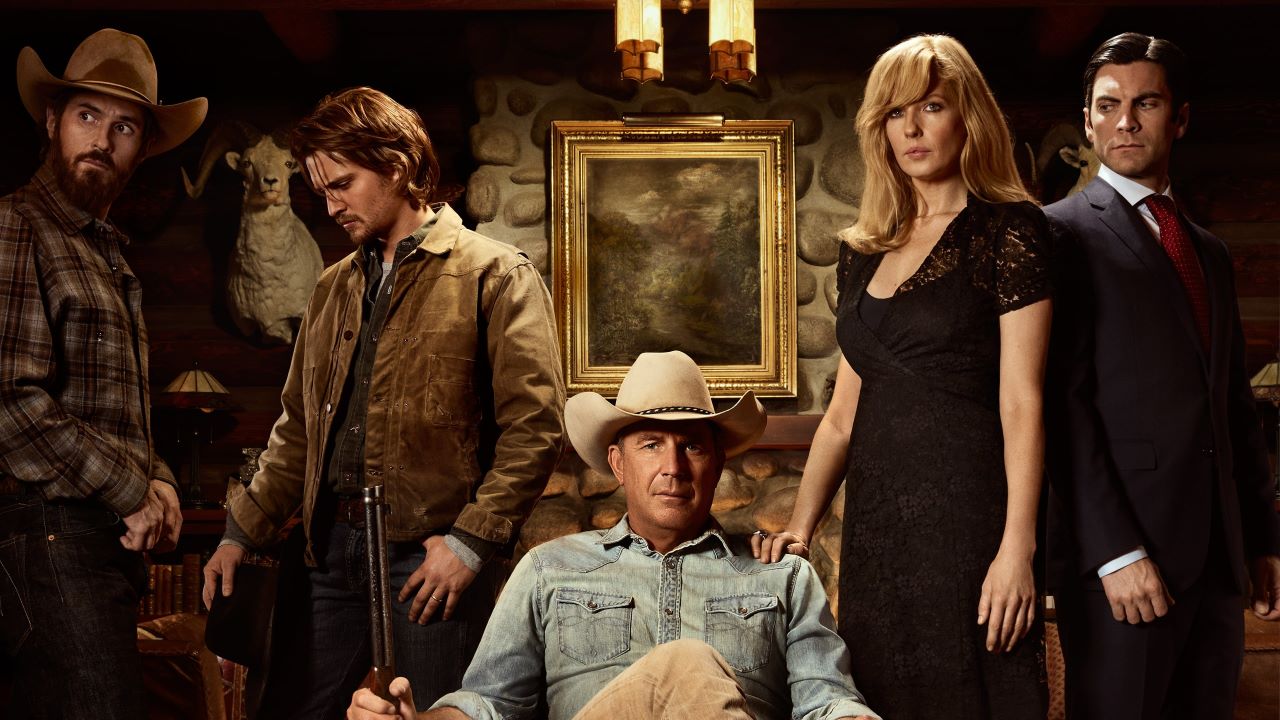
So, who are John Dutton’s children, and who’s in line for succession in Yellowstone? Let’s take a look at those playing the game of Yellowstone thrones.
First up is younger son Kayce Dutton (Luke Grimes), a former Navy SEAL soldier, husband to Native American wife Monica (Kelsey Asbille), and father to young son Tate (Brecken Merrill). Kayce’s a ruggedly handsome cowboy, at home on the range and a chip off the old John Dutton block when it comes to herding cattle, breaking in horses, and caring for the ranch. But does Kayce have the savage edge, business savvy, and merciless cold-blooded resolve that playing politics and fighting off the Dutton’s many enemies requires?
Then there’s Beth, John’s daughter. As played by British actor Kelly Reilly, Beth’s powerful and intelligent, yet emotionally volatile. She’s inherited John’s business brains and ruthless nature, and will stop at nothing to protect her Dad.
Despite her wayward ways and tough independence, by season four, Beth has married her long-time on-again, off-again lover Rip Wheeler, played by Cole Hauser. Rip’s a young runaway who was adopted by John as a surrogate son. As ranch foreman, Rip’s a formidable force. He not only keeps the cowboys and cowgirls working the ranch in line, he’s not averse to taking the odd enemy out “to the railway station”—which is Dutton code for shooting anyone who crosses them in the head and then hurling them off a cliff.
So yes, the Yellowstone-Dutton ranch is less home to cheery cowboy caricatures, and more a campground for amoral, cattle-rearing, horse-riding sociopaths.
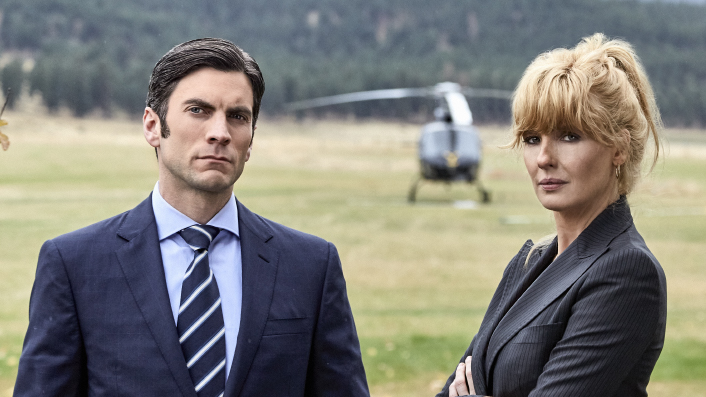
Every family has a disappointment, and for John Dutton, it’s his second-oldest son Jamie. As played by actor Wes Bentley, Jamie’s a hair-slicked back, suit-and-tie-wearing lawyer and wannabe politician. He’s about as weasely as a human being can get without actually possessing the DNA of a weasel. Jamie starts off loyal to his Dad, but as the seasons progress, he grows increasingly isolated and frustrated by his father’s seeming lack of respect. Mind you, that’s nothing compared to the seething volcano of hatred his sister Beth turns into whenever she and Jamie share the same airspace.
A few seasons in, and it’s revealed that Jamie was actually adopted by John Dutton and his late wife. Yup, poor Jamie-weasel. Turns out his real, biological, blood-father Garrett Randall, murdered his birth mother and went to prison, only to then reappear in the guise of character actor Will Patton. Given that Patton is typecast 99.9% of the time as a bad guy in pretty much every TV or film role he’s played, (outside of playing a cuddly cop in Halloween Kills and Ends), it doesn’t take a genius to work out that his re-entry into Jamie Dutton’s life spells trouble, with a capital T.
It’s pretty unlikely John Dutton will be handing the keys to the family ranch to weasely-Jamie anytime soon. But hey, in the world of Yellowstone? Anything’s possible. Heck, even Sawyer from Lost can turn up fishing in the Duttons’ river:
It’s Kevin Costner… as John Dutton
As John Dutton, Costner brings his formidable filmography to flesh out his character’s backstory. It’s a canny bit of casting, and saves on a heck of a lot of exposition or flashbacking in early seasons of Yellowstone. Credit is due to the casting of Josh Lucas as the younger John when they do go the flashback route, though—he’s a dead ringer for Costner in terms of mannerisms and bearing.
Experienced, tough-as-nails cowboy and cattle rancher? Assured on land as on horseback? Able to survive in the harsh, wild North American West, and even tame wild beasts and carnivorous canines? Sure, no problem. Costner’s your man. Check out Costner’s 1990 Oscar-winner Dances With Wolves:
How about that square-jawed, patriotic American Dad and preacher of tough morality that John Dutton embodies? No problem, here’s Costner as Superman’s adoptive Earth-bound dad, Jonathan Kent in 2013’s Man of Steel:
But then, Dutton’s no paragon of virtue. If crossed he’s more than capable of fighting back and playing just as dirty as his enemies. A skillset known as “The Chicago Way” that Sean Connery taught young Kev in Brian de Palma’s 1987 classic gangster epic, The Untouchables:
As for gun-slinging badass with plenty of experience out West? No problem, just see Lawrence Kasdan’s Westerns Silverado (1985) or Wyatt Earp (1994); or Costner-directed (and starring) 2003 Wild West tale, Open Range.
And yes, John Dutton can sure hold one hell of a grudge against his family’s enemies. Just look at how Costner refuses to let Bill Paxton’s family off the hook of relentless revenge in the 2012 US TV mini-series Hatfields & McCoys:
All cowboying aside though, Yellowstone features some pretty outlandish plotting and narrative arcs that go “through the looking glass”, as Costner’s New Orleans district attorney Jim Garrison said in Oliver Stone’s now-classic 1991 presidential assassination conspiracy thriller, JFK:
Put all these characters played by Costner together, and you get John Dutton, a man who holds his family and ranch together through sheer, true grit. It’s a filmography that makes Costner the ideal actor to play the patriarch who’s willing to play politics, wear a badge, saddle up, jump in his helicopter, throw a punch, or reach for his rifle as he sees fit because, as John Dutton says: “My land. My rules.”


